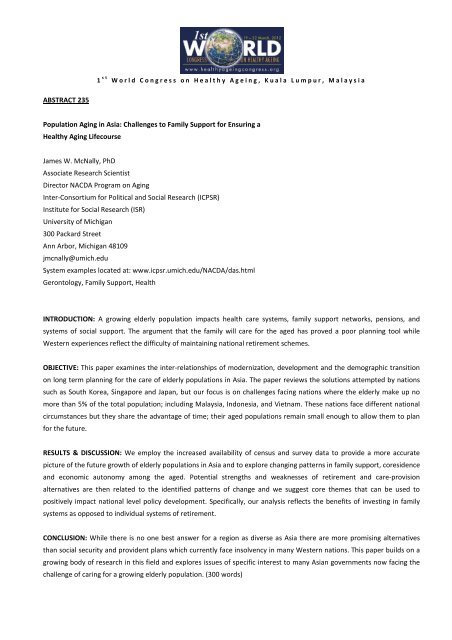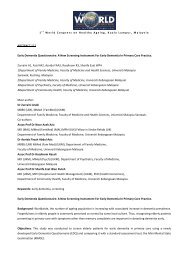ABSTRACT 235 Population Aging in Asia: Challenges to Family ...
ABSTRACT 235 Population Aging in Asia: Challenges to Family ...
ABSTRACT 235 Population Aging in Asia: Challenges to Family ...
You also want an ePaper? Increase the reach of your titles
YUMPU automatically turns print PDFs into web optimized ePapers that Google loves.
1 s t W o r l d C o n g r e s s o n H e a l t h y A g e i n g , K u a l a L u m p u r , M a l a y s i a<br />
<strong>ABSTRACT</strong> <strong>235</strong><br />
<strong>Population</strong> <strong>Ag<strong>in</strong>g</strong> <strong>in</strong> <strong>Asia</strong>: <strong>Challenges</strong> <strong>to</strong> <strong>Family</strong> Support for Ensur<strong>in</strong>g a<br />
Healthy <strong>Ag<strong>in</strong>g</strong> Lifecourse<br />
James W. McNally, PhD<br />
Associate Research Scientist<br />
Direc<strong>to</strong>r NACDA Program on <strong>Ag<strong>in</strong>g</strong><br />
Inter-Consortium for Political and Social Research (ICPSR)<br />
Institute for Social Research (ISR)<br />
University of Michigan<br />
300 Packard Street<br />
Ann Arbor, Michigan 48109<br />
jmcnally@umich.edu<br />
System examples located at: www.icpsr.umich.edu/NACDA/das.html<br />
Geron<strong>to</strong>logy, <strong>Family</strong> Support, Health<br />
INTRODUCTION: A grow<strong>in</strong>g elderly population impacts health care systems, family support networks, pensions, and<br />
systems of social support. The argument that the family will care for the aged has proved a poor plann<strong>in</strong>g <strong>to</strong>ol while<br />
Western experiences reflect the difficulty of ma<strong>in</strong>ta<strong>in</strong><strong>in</strong>g national retirement schemes.<br />
OBJECTIVE: This paper exam<strong>in</strong>es the <strong>in</strong>ter-relationships of modernization, development and the demographic transition<br />
on long term plann<strong>in</strong>g for the care of elderly populations <strong>in</strong> <strong>Asia</strong>. The paper reviews the solutions attempted by nations<br />
such as South Korea, S<strong>in</strong>gapore and Japan, but our focus is on challenges fac<strong>in</strong>g nations where the elderly make up no<br />
more than 5% of the <strong>to</strong>tal population; <strong>in</strong>clud<strong>in</strong>g Malaysia, Indonesia, and Vietnam. These nations face different national<br />
circumstances but they share the advantage of time; their aged populations rema<strong>in</strong> small enough <strong>to</strong> allow them <strong>to</strong> plan<br />
for the future.<br />
RESULTS & DISCUSSION: We employ the <strong>in</strong>creased availability of census and survey data <strong>to</strong> provide a more accurate<br />
picture of the future growth of elderly populations <strong>in</strong> <strong>Asia</strong> and <strong>to</strong> explore chang<strong>in</strong>g patterns <strong>in</strong> family support, coresidence<br />
and economic au<strong>to</strong>nomy among the aged. Potential strengths and weaknesses of retirement and care-provision<br />
alternatives are then related <strong>to</strong> the identified patterns of change and we suggest core themes that can be used <strong>to</strong><br />
positively impact national level policy development. Specifically, our analysis reflects the benefits of <strong>in</strong>vest<strong>in</strong>g <strong>in</strong> family<br />
systems as opposed <strong>to</strong> <strong>in</strong>dividual systems of retirement.<br />
CONCLUSION: While there is no one best answer for a region as diverse as <strong>Asia</strong> there are more promis<strong>in</strong>g alternatives<br />
than social security and provident plans which currently face <strong>in</strong>solvency <strong>in</strong> many Western nations. This paper builds on a<br />
grow<strong>in</strong>g body of research <strong>in</strong> this field and explores issues of specific <strong>in</strong>terest <strong>to</strong> many <strong>Asia</strong>n governments now fac<strong>in</strong>g the<br />
challenge of car<strong>in</strong>g for a grow<strong>in</strong>g elderly population. (300 words)
1 s t W o r l d C o n g r e s s o n H e a l t h y A g e i n g , K u a l a L u m p u r , M a l a y s i a<br />
REFERENCES:<br />
“Economic Hardship Among Elderly Pacific Islanders”. 2008. Sela V. Panapasa, Voon Ch<strong>in</strong> Phua and James W. McNally.<br />
AAPI Nexus Journal. Volume 6, Number 1. 2008.<br />
“<strong>Ag<strong>in</strong>g</strong> and Public Policy; Chapter Review”. 2007. James McNally and Martha Sayre. In: Experienc<strong>in</strong>g <strong>Ag<strong>in</strong>g</strong>: A Social<br />
Geron<strong>to</strong>logy Reader. Ciambrone, Desiree and Voon Ch<strong>in</strong> Phua (ed). Deer Park, NY: L<strong>in</strong>us Publication Inc. 2007.<br />
“Immigration and Poverty Among Elderly <strong>Asia</strong>n Americans <strong>in</strong> the 21st Century”. 2007. Voon Ch<strong>in</strong> Phua, James McNally,<br />
Keong-Suk Park. Journal of Poverty. Volume 11, Number 2. Summer, 2007. pp 73-92.<br />
“Diversity and Structure of Intergenerational Relationship: Elderly Parents-Adult Children Relations <strong>in</strong> Korea”. 2005.<br />
Keong-Suk Park, Voon Ch<strong>in</strong> Phua, James W. McNally RongJun Sun. Journal of Cross-Cultural Geron<strong>to</strong>logy. Volume 20,<br />
Number 4 / December, 2005. pg 285-305.<br />
Contact Information<br />
James W. McNally, Ph.D<br />
Direc<strong>to</strong>r, NACDA Program on <strong>Ag<strong>in</strong>g</strong><br />
Institute for Social Research<br />
University of Michigan<br />
330 Packard Street<br />
Ann Arbor, Michigan 48109 USA<br />
Tel.: 01-734-615-9520<br />
Fax: 01-734-647-8200<br />
E-mail: jmcnally@umich.edu















